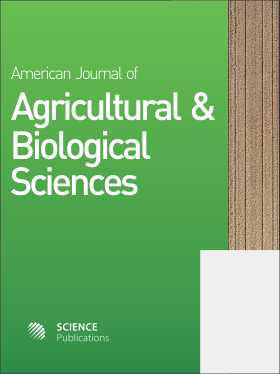BIOCHEMICAL STUDIES ON NIGERIAN MONODORA TENUIFOLIA SEED
- 1 Department of Biochemistry, Faculty of Sciences, Imo State University Owerri, Imo state, Nigeria
- 2 Department of Biochemistry, Faculty of BiologicalSciences, University of Nigeria Nsukka, Enugu State, Nigeria
Abstract
The nutritive constituents of the seeds of Monodora tenuifolia were analyzed to augment the available information on Monodora tenuifolia research. Blood glucose and lipid profile were investigated on the flavonoid rich fraction of M. tenuifolia in rats. The composition (gkg-1) of alkaloids, cyanogenic glycosides, tannins and flavonoids were 13.3±0.1, 21.2×10-2±0.6, 1.3±0.1, 1.7±0.1 and 11.7±1.1 respectively. The proximate composition (gkg-1) of M. tenuifolia seed were crude fibre (262.3±1.2), crude protein (82.6±1.0), crude fat (349.9±1.9), ash (49.9±0.6), moisture (190.0±0.00) and carbohydrate (65.5±4.7). Analysis of the minerals content (gkg-1) yielded calcium (864.0±29.38), sodium (2752.0±140.35), iron (3.34±0.06), zinc (5.26±0.08), potassium (326.4±13.06), magnesium (342.9±13.71) and phosphorus (9.52±0.17), while vitamin analysis yielded vitamin A (10.05±0.17 iu/100 g), C (56.40±0.14 gkg-1) and E (11.71±0.87 iu /100 g), thiamine (0.11±0.01 gkg-1), niacin (0.46±0.32 gkg-1) and riboflavin (0.04±0.01 gkg-1). The results of amino acid analysis showed the total amino acid of M. tenuifolia seed was 71.78 of crude protein. The total essential amino acid with Histidine was calculated to be 29.24 of the crude protein. The antinutrient analysis of M. tenuifolia shows it contained total phenol (0.8±0.0 gkg-1), oxalates (4.09±1.17 gkg-1), phytates (0.012±0.42 gkg-1) and trypsin inhibitor (0.230±0.42 iu/g). The main fatty acids of the seed oil are linoleic acid (401.7 g kg-1), oleic acid (346.1 g kg-1) and palmitic acid (122.61 g kg-1). The LD50 of the flavonoid-rich fraction was found to be above 5000 mg kg-1 b.w. After the day 14 study, biochemical markers such as triacylglycerol, very low density lipoprotein increased significantly (p<0.05) compared with the control while high density lipoprotein decreased significantly (p<0.05). After the dat 28 study, no significant (p>0.05) effect was observed on the blood glucose and lipid profile of wistar albino rats compared with the control. The result shows that M. tenuifolia seed is rich in important nutrients, has edible oil and has no deleterious effect on blood glucose and lipid profile of albino rats.
DOI: https://doi.org/10.3844/ajabssp.2013.257.267

- 5,862 Views
- 6,368 Downloads
- 12 Citations
Download
Keywords
- Monodora Tenuifolia
- Spice
- Nutritive Constituents
- Blood Glucose
- Lipid Profile
- Rats
